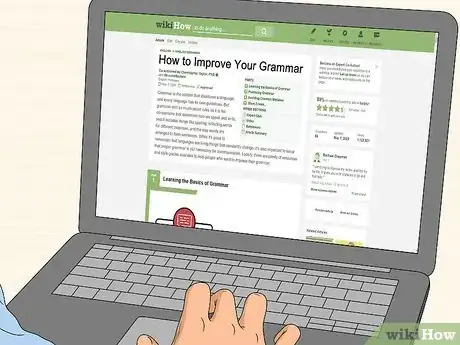This article was co-authored by Leah Morris and by wikiHow staff writer, Danielle Blinka, MA, MPA. Leah Morris is a Life and Relationship Transition coach and the owner of Life Remade, a holistic personal coaching service. With over three years as a professional coach, she specializes in guiding people as they move through both short-term and long-term life transitions. Leah holds a BA in Organizational Communication from California State University, Chico and is a certified Transformational Life Coach through the Southwest Institute for Healing Arts.
There are 9 references cited in this article, which can be found at the bottom of the page.
This article has been viewed 91,490 times.
You don’t need word of the day toilet paper or a huge vocabulary to sound smart. Instead, focus on presenting your ideas in a clear, coherent way. With a few new habits, you can impress your friends, outshine your fellow students, or make waves at work.
Steps
Choosing Your Words Carefully
-
1Use common words and phrases so you can clearly present your ideas. You might feel pressured to use “scholarly” words to sound smart, but it’s best to focus on being understood. Stick to everyday words that most people will know. Just try to use the best words possible to share your ideas.[1]
- It’s okay to say something like, “If we don’t work together to reverse climate change, our world is headed for catastrophe.” You don’t need to say, “Without cooperative interaction between persons from all cultures, our world will experience a colossal loss never before seen.”
- Don't use unnecessary big words or a thesaurus. When you use complicated language for no reason, people usually assume that you want to sound smarter than you are.[2] For example, it’s okay to say, “We had tremendous growth this quarter,” but you might not say, “We experienced prodigious augmentation this quarter.”
-
2Use active sentences instead of passive ones because they're stronger. When the subject of your sentence performs the action, it’s called “active voice,” while “passive voice” happens when your subject receives the action. Generally, active voice is better because it’s more concrete and concise than passive voice, which can be vague. Practice phrasing your sentences so the subject is always performing an action.[3]
- For instance, say, “I made dinner,” not “Dinner is made.” Similarly, say, “Research shows that students who read get better grades,” rather than, “It’s shown by research that students who read get better grades.”
Advertisement -
3Eliminate filler words from your vocabulary. You may accidentally use filler words without even knowing it. Words like “um,” "uh," “er,” “like,” and “you know” make you sound uninformed, even though you might know a lot about what you’re talking about. While it’s hard to stop using these words, you can do it with practice. Speak slowly and intentionally to help you stop.[4]
- Try asking people you trust, like your best friend and family members, to call you out when you use a filler word. For instance, they might interrupt you and say, “Like!” everytime you say “like.”
- Film yourself speaking so you can catch how often you use the words.
-
4Speak only when you have something meaningful to say. It might sound impossible, but sometimes silence can actually make you sound smart. When you talk too much in a conversation, it can make people see you as less knowledgeable about a topic, especially if you tend to push your opinions. Share your ideas and background knowledge only when it pushes the conversation forward or adds something meaningful.[5]
- For example, let’s say you’re talking about politics with a friend. You’ll sound really smart if you share a position that’s relevant to the conversation, along with a couple of supporting facts. On the other hand, people will tune you out if you dominate the conversation with side topics and attacks on other positions.
- You might say, “I’m voting for Keely Pierce for mayor because she wants to revitalize downtown. Infrastructure repairs and free metro trips to downtown will attract more foot traffic, as well as new businesses. This will be good for the entire city.” Then, let other people share their thoughts.
-
5Use proper grammar so you sound educated. You don’t have to earn a degree to be smart, but people will probably think you're more intelligent if you follow grammar rules. If grammar isn't a strong skill for you, watch online tutorials and use online tools to brush up on your grammar skills. Additionally, practice good grammar in conversations with friends to help you improve.[6]
- If you're not sure if grammar is a skill you need to improve, ask a few trusted friends for their honest opinion. You might also talk to a trusted teacher or coworker.
Making Good Arguments
-
1Research the topic in advance if you can. It’s impossible to know everything, so don’t feel bad if you don’t know a lot about a topic. If there’s a hot topic at work, at school, or in the news, read up on it before you share your ideas. This will help you make informed opinions so you sound super smart.[7]
- Try to learn background information, what’s currently happening, and concerns for the future.
- If you don't have time to read a lot of information about the topic, review a few articles and focus on the key points. If the topic is a book, you might read an overview or study guide for the book.
- At school, you might encounter topics like a novel or historical events. In current events, you might see topics like the spread of a pandemic or political issues. At work, this might include something like market trends or increasing sales in a recession.
-
2Bring up a subject you know a lot about if possible. You're probably very knowledgeable about a handful of topics that are interesting to you. When you’re in a discussion and feel lost, try turning the conversation toward things you know. As an alternative, draw on the topics you know for examples that relate to the subject you’re discussing.
- Let’s say you’re hanging out with friends and they start talking about a book you haven’t read. You might say something like, “That makes me think of Brave New World! Have you read that?”
- If you can't change the subject, pull facts about other topics into the discussion. If the other person says something like, "The symbolism in this book is so powerful," you might reply, "I enjoyed the symbolism in The Great Gatsby."
-
3Stick to a few main points so your message is concise. It seems logical that giving people lots of reasons and facts that support your views would help convince them. However, doing this might actually undermine your argument because it sounds like you’re all over the place. Instead, focus on your main points and try to keep your argument short.[8]
- Say something like, “Our community needs park benches because they encourage people to use the park and they provide parents a comfortable place to sit while watching their children play.” Don’t bring up other problems with the park or attack people who don’t want benches.
- Memorizing a few facts or key points about your topic will help you sound more knowledgeable. You might even learn the names of a few key experts to lend your argument some support. You could say, "According to Michelle Steinberg, the director of the National Fire Prevention Agency’s (NFPA) Wildfire Division, houses and other manmade structures can be more flammable than vegetation in some cases."
-
4Listen when other people are talking to understand their ideas. It’s totally normal to try to think of what you’re going to say next while another person is talking. However, it’s really hard to understand someone’s arguments if you aren’t listening to them. Plus, people will think you’re closed off to new ideas if they realize you aren’t listening. Focus your full attention on the person who’s talking so you can give a thorough response when the time comes.[9]
- It might help to paraphrase what the person said back to them to give you more time to decide what to say. This might sound something like, “It sounds like you don’t support the downtown revitalization because you’re worried about rent going up,” or “So you’re saying libraries need longer hours?”
- You can also pick up on a few key facts about the topic while you're listening to the other person's ideas. This can be a big help if you don't know a lot about the topic.
-
5Ask questions if you don’t know about something. You might worry that asking questions makes you look uninformed, but it actually shows you’re smart and engaged in the conversation. An intelligent person wants to learn and grow, and that’s where questions come in. When you ask a question, really listen to the person’s response, and don’t be afraid to ask follow-up questions.
- Let’s say your literature class is discussing the novel Animal Farm, and another student starts talking about how it’s a fable about the Bolshevik revolution in Russia. Go ahead and ask questions like, “What’s the Bolshevik revolution?” or “Why is this a fable?”
- Similarly, one of your friends might say something like, “I can’t believe you buy clothes from that store after last month’s scandal.” Say, “I didn’t hear about the scandal. What happened?”
- If someone presses you to share an opinion about a topic you don't know a lot about, it's okay to say something like, "I need to do more research on this topic before I feel comfortable taking a stand," "I need to review the background information to be sure," or "I'm waiting for more evidence to come to light before I draw conclusions."
Using Body Language
-
1Make eye contact during the conversation. Eye contact makes you seem trustworthy and confident about what you’re saying. You don’t need to stare into the other person’s eyes. Instead, look into their eyes for 3-5 seconds at a time. Shift away for 1-2 seconds, then make eye contact again.[10]
- If eye contact is hard for you, practice by staring at yourself in the mirror. Then, get a friend or relative to help you practice staring into each other’s eyes. With practice, you can feel comfortable making eye contact.
-
2Stand up straight with your chin up so you seem authoritative. Good posture makes you look and feel confident and self-assured. Naturally, people will interpret your confidence as a sign of intelligence. Maintain good posture by keeping your back straight and looking forward.
- Be careful not to slump or look down, as this makes you look less confident.
-
3Gesture as you speak to add power to your words. Using meaningful gestures keeps listeners engaged and makes you seem like you really know what you’re talking about. Practice your gestures in front of a mirror or on video until they feel natural. Here are some basic hand and arm gestures you might try:
- For a generic gesture, spread your arms out with your hands palm up. Bring them back in, then spread them out again.
- If you’re talking about something you don’t agree with, you might push your hands away from your body to show opposition.
- When you’re listing things, use your fingers to show “1,” “2,” “3,” etc.
- To hammer home a point, turn 1 hand into a fist and then bring it down onto the palm of your other hand.
-
4Don’t fidget with your hair or accessories because you’ll seem uncertain. While gestures are good, fidgeting can undermine everything you’re saying. Do your best to keep your hands away from things like your hair, jewelry, tie, or collar. Otherwise, people might think you don’t know what you’re talking about, even if you’re very informed.
- If you notice yourself start fidgeting, place your hands in your pockets or at your sides for the time being. Even though gesturing is important, it’s better to be still if you’re having a problem with fidgeting.
References
- ↑ https://www.vocabulary.com/dictionary/sesquipedalian
- ↑ https://www.vocabulary.com/dictionary/sesquipedalian
- ↑ https://writing.wisc.edu/handbook/style/ccs_activevoice/
- ↑ https://hbr.org/2015/10/the-science-of-sounding-smart
- ↑ https://missionself.com/art-of-silence-learning-when-not-to-speak
- ↑ https://www.theladders.com/career-advice/want-to-sound-smarter-master-these-grammar-tips
- ↑ https://www.navhindtimes.in/2019/03/02/opinions/opinion/importance-of-being-well-informed/
- ↑ https://www.youtube.com/watch?v=xiDb4Jdcg3A
- ↑ https://www.forbes.com/sites/johnhall/2013/08/18/13-simple-ways-you-can-have-more-meaningful-conversations/#7dc813454fe9
About This Article
To sound smart, avoid using unnecessary filler words, like "um," "well," and "like," since they can make you appear uncertain. Also, try to use descriptive vocabulary, like "thrilling," "depressing," and "remarkable," instead of vague words like "good," and "cool." You should also avoid phrases like "I guess," "I'm not sure," or "maybe I'm wrong," since they undermine what you're saying. For tips on how to project confidence so you appear smarter, scroll down!







































































